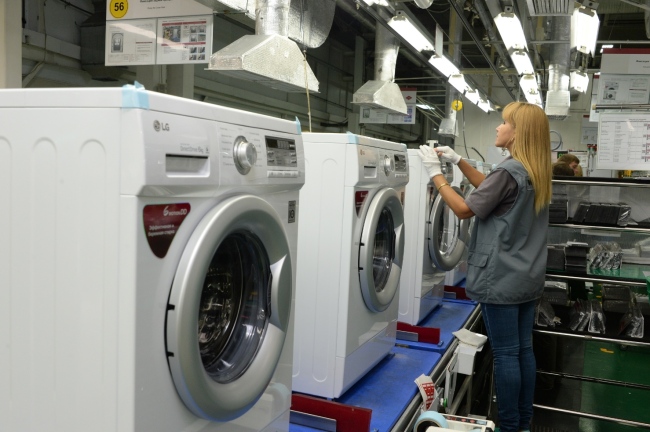MOSCOW/RUZA -- Inside the electronics store M.video, near Sheremetyevo International Airport in Moscow, customers flock to a 65-inch LG Signature organic light-emitting diode TV displayed at the front of the TV section.
People check the front and the rear of the luxury TV set, marveling at how thin the TV screen has become thanks to technological advancements.
Despite the jaw-dropping price of 499,990 rouble ($7,800), about six times more than the average monthly wage in Russia, the luxury TV set has become the talk of town in Russia.
LG Electronics’ Russia operation has released the TV sets at 32 stores across the country since August. And it has been selling well despite the unfavorable economic condition, the company said without releasing sales numbers.
“A boom in OLED TVs is happening here. Despite the deteriorating economy, demand for high-end products is still high,” said a sales manager from LG Electronics’ Russia operation, referring to the deepening economic polarization in Russia.
Russia’s economy has been fluctuating since 2014 when the US and EU slapped sanctions over its actions in Ukraine. Its currency rouble tumbled along with freefalling oil prices. Inflation rose sharply as well as the percentage of people without jobs.
The worsening economy dealt a severe blow to the electronics market in Russia. Its size shrank by around 30-40 percent from 2014. Demand for TVs was hovering at 10 million units a year before 2014, but demand is now under 7 million units.
But LG has high hopes for a quick market recovery, saying Russia has market potential with a strong consumer base in the high-end and mid-income sectors.
“The economy is not as good as it was before, but it won’t take long for a full recovery. We should prepare for that,” Song Dae-hyun, executive vice president and CEO of LG Electronics’ Russia operation told reporters visiting its factory in Ruza, 86 kilometers west of Moscow, Monday.
“In the meantime, we will take LG Signature as a key tool to improve LG’s brand value and build customers loyalty through corporate social responsibility programs.”
Even before Seoul established a diplomatic channel with Moscow, LG opened its office in the Russian capital in 1990. In 2006, the South Korean electronics giant started producing TVs and other home appliances by building a production facility in Ruza.
For the last 10 years, LG’s Russia operation produced 20 million units of TVs and computer monitors, 8 million units of washing machines and 4.5 million units of refrigerators. Key components are delivered from South Korea, but most of the products are made in Russia and by Russian people. The company currently has 1,400 local employees in Russia.
“We started the business here targeting general consumers. Then we needed to have the people accepting our brand,” the CEO said.
“That is why we have been telling them LG Russia is a Russian company,” he said, adding that one of every two households in Russia presumably own LG devices.
Its production rate has been growing at around 30 percent a year since 2006, making LG a leader in the Russian electronics market.
But to keep LG’s brand value, the company has been making efforts to build customer loyalty through various corporate social responsibility programs. For example, promoting a nationwide blood donation campaign in collaboration with the Russian Health Ministry. The company has also been helping locals by operating shuttle buses and dispatching firefighters to houses on fire nearby.
According to a recent survey by market tracker GfK, 99.3 percent of respondents said they mention LG when asked what electronics brands they know.
“LG is the premium brand that customers seek when entering the store,” said a shop assistant at M.video. “There is no Russian who doesn’t know about LG.”
By Cho Chung-un (
christory@heraldcorp.com) / Korea Herald Correspondent








